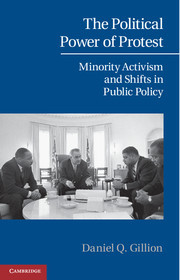The Political Power of Protest Minority Activism and Shifts in Public Policy Cambridge Studies in Contentious Politics Series
Langue : Anglais
Auteur : Gillion Daniel Q.

Gillion demonstrates the direct influence that political protest behavior has on Congress, the presidency and the Supreme Court.
Gillion demonstrates the direct influence that political protest behavior has on Congress, the presidency and the Supreme Court, illustrating that protest is a form of democratic responsiveness that government officials have used, and continue to draw on, to implement federal policies. Focusing on racial and ethnic minority concerns, this book shows that the context of political protest has served as a signal for political preferences. As pro-minority rights behavior grew and anti-minority rights actions declined, politicians learned from minority protest and responded when they felt emboldened by stronger informational cues stemming from citizens' behavior, a theory referred to as the 'information continuum'. Although the shift from protest to politics as a political strategy has opened the door for institutionalized political opportunity, racial and ethnic minorities have neglected a powerful tool to illustrate the inequalities that exist in contemporary society.
1. A continuum of information: the influence of minority political protest; 2. Measuring information in minority protest; 3. Viewing minority protest from the hill: the response from an individual and collective body of Congress; 4. Knocking on the president's door: the impact of minority protest on presidential responsiveness; 5. Appealing to an unlikely branch: minority political protest and the Supreme Court; 6. Conclusion: settling protest dust and a future outlook on minority policies.
Daniel Gillion is an Assistant Professor of Political Science at the University of Pennsylvania. His research interests focus on racial and ethnic politics, political behavior, public opinion and the American presidency. Gillion's research has been published in several journals and books, including Oxford Handbook of Political Behavior, Electoral Studies and The Journal of Politics. Before joining the University of Pennsylvania's faculty, he was the distinguished provost fellow in the political science department at the University of Rochester, where he completed his PhD. He currently serves as the Robert Wood Johnson Health Policy Scholar and the Ford Foundation Fellow at Harvard University.
Date de parution : 04-2013
Ouvrage de 210 p.
13.9x21.6 cm
Date de parution : 04-2013
Ouvrage de 210 p.
14.5x22.1 cm
Thème de The Political Power of Protest :
© 2024 LAVOISIER S.A.S.



